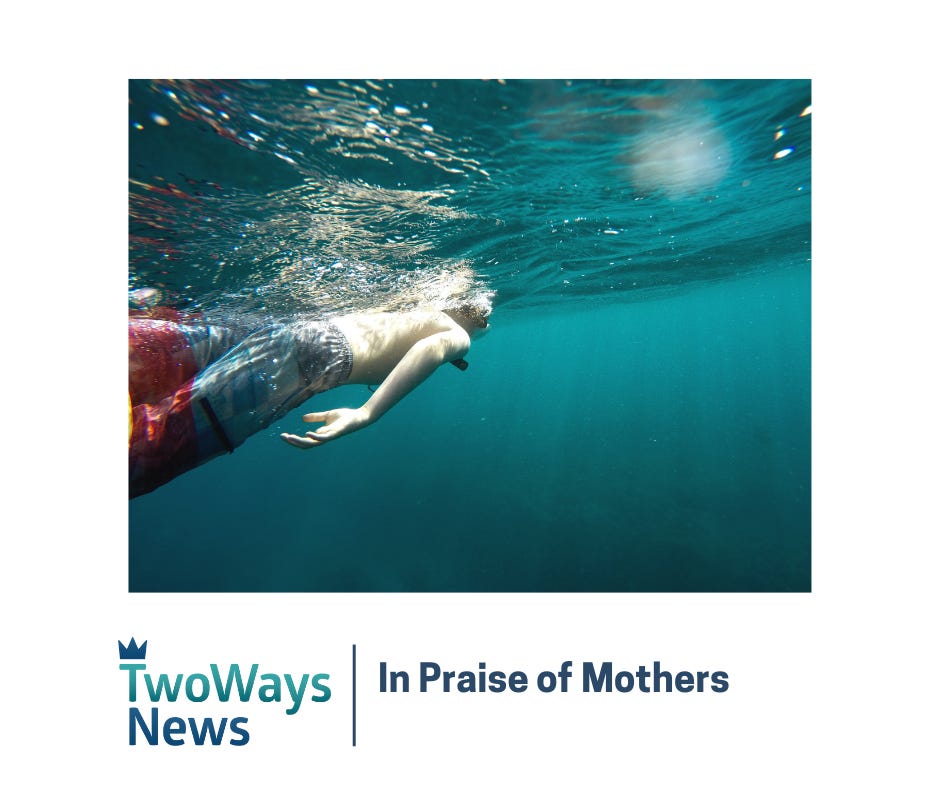Dear friends,
Motherhood and apple pie is no longer the foundation of Western civilisation. Apple pie is still pretty important, but motherhood has now been challenged. Peter and I had the privilege of the same mother, whom we loved and admired, and remember with great fondness. Yet the kind of family life in which we were raised has undergone considerable change during our lifetime. Mother’s Day brings us to reconsider family life.
Yours,
Phillip
Phillip Jensen: Welcome to Two Ways News with Phillip Jensen and
Peter Jensen: Peter Jensen, his big brother.
Phillip: Brotherhood is very important because today we are speaking about motherhood. These days Mother's Day is one of the most important days in the Australian calendar. All Australians celebrate Mother's Day. It is also one of the easiest days of the year to invite people to church. Mothers, if they care to say to their widespread family of children and grandchildren, “What I want for Mother's Day is for you all to come to church with me in the morning and then take me out to lunch,” it's a surefire win. Children can also invite their mothers, saying, “Mum, I'd really love to celebrate Mother's Day by taking you to church and out to lunch afterwards.” Mother's Day came from church. But that's another story we'll talk about later. Peter, what's your memory of our Mum?
Peter: Of the many memories, one of the things in particular is that she was very good at giving advice and giving memorable advice. Phillip, what is some of the advice our mother gave you?
Phillip: “If you don't dress like a leader, no one will treat you like a leader.”
Peter: Obviously, neither of us has taken any notice of that.
Phillip: It wasn't until after she died that it crossed my mind to ask the question, “Why do I want to be a leader?”
Peter: Because your mother told you you had to be.
And then, most famously, when we went to the beach, the advice was always, “Swim with a fat man between yourself and the open sea,” assuming, therefore, that the shark would go for the fat man first. And then there was a subsidiary piece of advice….
Phillip: Yes, “You are the one who runs for help!”
Peter: You got it. Why would she have said that?
Phillip: Because she couldn't swim, so there was no way she was ever going to rescue us. But another reason was you were doing something noble; you're participating and being helpful. It's not like you're being a coward or a deserter. But at the same time, there is no chance of you drowning if you're the one who runs for help. So she kept us alive while keeping our morale and morality high.
Phillip: Mothers do more than just give pieces of advice. They bring us to birth in the first place. They feed us and nourish us. One of my memories of Mum is that she was always there at home for us. On one occasion she got home late because of a car accident. I remember being struck by this sense that there was something wrong with the world because she wasn't there when she said she would be. You realize the reason I don't have a security problem is because she made me so secure because she created security in the world. There was that sense that Mum was always there, and undoubtedly, for us, so that whenever there was a quarrel or fight with a teacher or something, she would be up at the school fairly quickly to defend our cause. Not in the same way that modern mothers might be accused of bullying teachers, but you always knew that Mum was on your side.
Peter: Undoubtedly, you're right, and it made a huge difference. Dad was wonderful too, but he was extremely busy supporting the family, and our mother's presence was immensely important to us.
We have been speaking about Mother's Day, but isn't it fair to say it is a commercial anniversary? What the commercial world likes about Christmas, Easter, and Mother's Day is that people spend money.
Phillip: It is a very sad story. It is different from Mothering Sunday, which is an English tradition that comes from much further back and is celebrated by some people to this day. But Mother's Day came in 1907 in America from a woman called Anna Marie Jarvis. Her mother, who was Anne Marie Jarvis, was a mother of a big family of 11 or so children and was a very keen Christian. She was conscious that motherhood was a very important thing that the society wasn't taking with sufficient significance. When she died, her daughter, Anna, then decided that they should have a celebration. So, in her church, she bought hundreds of carnations and gave them out as an expression of thanksgiving for Mother's Day. She even created the tradition of giving one colour for mothers who were still alive and another colour if their mother had died. She called upon people to celebrate Mother's Day. It spread across the churches of North America with enormous speed. By 1914 President Woodrow Wilson had declared it as a national holiday. It was a cheap political stunt because it was on a Sunday, which was a public holiday already. It didn't cost anybody very much to have it as a national holiday, but it did spread the observance across the nation.
It was sad because Anna Jarvis was hurt by the commercialization of this celebration of her Mother's Day. Carnations and chocolates became heavily commercialized. She spent most of her adult life fighting against the commercialization and was very saddened by it because the memory of Mother got swallowed up by the celebration of flowers and chocolate. That was not what she meant. As a God-fearer, she wanted to thank God for mothers. So, it's classic that Mother's Day would come out of church because Christians value motherhood more than other people.
Peter: Is that fair? What makes you think that? Motherhood is a universal and universally honoured expression and experience. What is it that leads Christians in particular to value motherhood?
Phillip: We all have a mother; you would expect it to be something that we would all honour. But having children is no longer the normal expectation of the women of the Western world or parts of Asia as well. Birth rates have dropped alarmingly in the last generation or so. By the turn of the century, the Australian birth rate had dropped to 1.7 children per woman. Now it's below 1.5. You need to have 2.1 children per mother to have the population remain static, let alone grow. The idea of 11 children, such as Anna Mary Jarvis's family, is unheard of or unthinkable these days. But it's more than that; it is philosophically so. From the 1960s, you had ZPG, the “Zero Population Growth” movement, which took that kind of Malthusian line that if we keep producing children, then we're going to starve. They gave statistical projections as to the troubles that would occur before the end of the 20th century by the number of children coming into the world. But it didn't happen. However, the concept of having children became less attractive to people. The Chinese went to their one-child family as a way of meeting their population problems. Now they've got a population problem in that they don't have enough children. Similarly, North Korea has real difficulties. It's a lifestyle choice. Around the year 2000, there was a popular movement here in Australia called “the Child-Free Zone,” which encouraged people to sign up to live a child-free life because of the advantages of living a child-free life and the disadvantages of having children.
These days motherhood can now be spoken against and written against. Consider some statistics in Australia. University graduates in Melbourne who are atheists have the lowest rate of reproduction. That is understandable because a career has become the alternative to motherhood, and for atheists, the value of other people's lives is not high in their priority listing. Christians take a different view because God is the creator of life. When we come into Christ Jesus, we come back into our belief in the creator and therefore in the creation. The values of the creation found in the creator become our values. Christians are family people. That is not to say every woman has to have children. That is not to say every woman will have a child. In fact, given the judgement of the world, it's very difficult.
Motherhood matters to us. It is caught up in the Ten Commandments that you “honour your father and your mother, that your days may be long in the land the Lord is giving you.”
Peter: You mentioned the mother from the 19th century who had 11 children and who herself died young. That was before the contraceptive pill, which came into use somewhere around 1962-63. In the period before then, our own mother had an enormous amount of housework to do to sustain her three boys and her husband. It was hard work just to get the washing done and to get the shopping done. The technological revolution meant that she owned her first car in the mid-50s. The washing machine came, and other advances emerged and meant that she was set free from an awful lot of problems. Had she had 11 children, she would have been, like many women, one of the most hardworking persons on the planet. Is it good that births can be controlled now and not all the children that could be born are born?
Phillip: Yes and no. I don't think that we each personally have to multiply and fill the earth. Birth control has become much more efficient. But it did exist before. The Catholic families who didn't believe in any birth control were significantly larger in Australia than the Protestant families because there was the exercise of birth control prior to the coming of the pill. The pill just made it more in the hands of the woman and more efficient. Both the pill and big technological changes have significantly changed the lives of women in our society. That's why a couple of books by Louise Perry and Mary Harrison, challenging the feminist view of life and the feminist view of marriage, are right to point out that women were workers long before the pill. Before the Industrial Revolution, they were like the Proverbs 31 woman, someone who had home industries operating. It was the cotton mills and the making of clothing in the Industrial Revolution that also transformed and changed the lives of women in a previous century. Here in the 21st century, yes, we've seen these big changes in the roles and lives of women.
Peter: In many ways for the good.
Phillip: Yes, in many ways for the good. Look at the number of women who died giving birth and children who died at birth. It was a big problem in previous generations. But thanks to medical technology, we've seen huge changes. But our wealth and affluence and the technology of birth control have changed our mindset about the value of children and the valuing of motherhood. So that now we have this ability and this wealth to have children, but we have so constructed life that we don't have the time for them. We have so many alternative lifestyles that we don't see it as valuable. That's not everybody, of course. One of the problems of this topic is there are so many different stories of individuals, of the women who would have loved to have children and can't, and of the women who have had more children than they can cope with. There are exceptions. But in principle, the valuing of motherhood as a good thing has been diminished in our society over the last 50 or more years with the increasing wealth, prosperity, and hedonism of our society. That's a bad thing, which I think Christians are spared to some extent because we are taught to value human life.
In the prayer books that have come out of recent times, as the church has moved to increased liberalism and increased secularism, the reason for marriage gets changed. So, in the old prayer books, reason number one for marriage was having children. Reason number two was for the fellowship in a relationship, the love and affection, and the intimacy of husband and wife. Reason number three was to avoid sin. In liberal prayer books, the avoiding of sin gets chopped out. But the other two get reversed. The first reason is for fellowship between husbands and wives and the pleasures we can have with each other. Then secondly, having children. That is a shift away from what the Bible teaches. It's a shift away from the creation. It's a shift that is undermining the importance of motherhood. How sad it is.
Peter: It is sad. We are two men who have experienced motherhood, both in the women we are married to and also in our mother. We can see the value of it and sense the value of it. There's hardly a day that goes by when I don't think of my mother, who died in 1969, and value and treasure her and the gift she gave us in just being herself, funny though she was in many ways. But of course, you're not just speaking here of motherhood, although we're speaking of Mother's Day. The mother is not doing the job on her own; it is the family. Undoubtedly, marriage is now undervalued, and there are so many divorces. Nonetheless, when people simply live together, that is an even more volatile situation. We now see men and women simply growing up not having experienced the security of the father and the mother. The contribution of the mother is immense, but that of the father is huge and is a different one, designedly so, but immensely important.
Phillip: Yes, the ironing out of the difference between men and women has been a disaster for both. Fatherhood is important, and I guess we'll talk about that come Father's Day. But the best thing a father can do is love the mother of his children. Stay with her, care for her. Part of the reason we celebrate motherhood, especially as adults, is the recognition of just how hard the job is. I don't think anybody works harder in life than a mother of young children. It is unrelenting. It is a seven-day-a-week job, 24 hours a day. At any time you can be called upon by the child. There is no harder job, and so it is bad when you hear people describe themselves as ‘just a mum.’
Peter: Yes, and by the way, if I may point out, there is something harder. It's being the mother of twins. But I say that from experience. But leaving that aside, I always think that the most honourable title I've ever received is that of father and husband, apart from being a son of God. When people define us in terms of the work we do, and when we encourage people to think that our work is going to be the aim and purpose of our life and we are who we work as, it's so tragic because the heart of life is relationship. It's called love. The true love, the love that stays, the love that persists, the love that gives, the love that sees the other person as being the one who we should serve. The role of parent, the role of husband, and the role of wife are as important as it gets, if you have the privilege. Some people don't have that privilege, and some people don't seek that privilege, and that's okay too. But if you have that privilege, then that is, to my mind, the most important thing of all.
Phillip: Identity is one of the big problems of our youth. You and I don't have much of an identity problem, nor do our contemporaries. That's because we came from intact families where we found our identity. If you look for your identity in your achievements, for some of us, there's not much. And for others, even the success we have is soon forgotten and lost because of someone coming along who's better at what we used to do. Our identity is in our family. It's a set of relationships. “I am the son of…” or “I'm the third son of these people.” My surname is an important indicator of my identity because it's saying whose family I am, who's my father, and who's my mother. It even indicates who my brother is. I agree with you that when people ask about me, I would say, “Apart from being a follower of the Lord Jesus Christ, I'm a husband, I'm a father, and I'm a grandfather.”
Peter: I once asked a palliative care chaplain, “What are our men talking about in palliative care?” In other words, in the days before they die, what are they talking about? And she said to me, “Peter, I'll tell you what they're not talking about. They're not talking about their work life. That is as if it has never been. They're talking about their relationships, often with deep regret." That's very powerful, and it's a reminder to us of the sheer importance of love.
Why not help support Two Ways News?
If you enjoy Two Ways News, why not lend us a hand? Consider joining our Supporters Club—friends who make it possible for us to keep producing this article/podcast.
To join the Supporters Club, follow the link below to the ‘subscribe’ page. You’ll see that there’s:
a number ‘paid options’. To join the Supporters Club take out one of the paid ‘subscription plans’ and know we are deeply grateful for your support!
also the free option (on the far right hand side)












